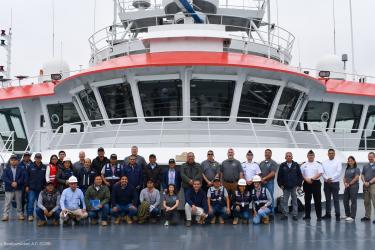Breakthrough in Tropical Tunas and Swordfish Negotiations
Following years of hard-fought negotiations, the International Commission for the Conservation of Atlantic Tunas adopted a comprehensive conservation and management measure for Atlantic tropical tunas, including bigeye, skipjack, and yellowfin tuna. The negotiations involved a diverse set of parties from around the world with widely divergent fisheries, conservation, and development interests. The Commission adopted new control measures and allocation decisions that reflect the diverse interests within ICCAT’s tropical tunas fisheries for the first time after years of unsuccessful negotiations. As a result, the United States solidified its current level of access to this fishery and collaborated to advance a path to future management strategy evaluations for tropical tunas.
ICCAT also adopted its first management procedure for North Atlantic swordfish. A management procedure establishes an agreed framework for future management decision-making—such as setting catch limits—designed to achieve specific objectives. These objectives could include attaining conservation goals and maintaining stability in fisheries. ICCAT continues to make significant progress in adopting management procedures for several stocks under its management, thanks to years of dedicated effort by scientists and managers. This advancement will allow for more effective management of stocks in the face of identified uncertainties. The management procedure establishes the annual total allowable catch for North Atlantic swordfish through 2027.
With its adoption, ICCAT parties also renegotiated the allocation of North Atlantic swordfish. The United States maintained its current quota of 3,907 tons.
“After lackluster progress in 2023, this year, ICCAT demonstrated the value of multilateral, consensus-based decision-making in managing international fisheries sustainably. The United States not only maintained access to our historical allocations for both bigeye tuna and swordfish, but our team also led efforts to progress ICCAT’s work on climate change—helping the organization build toward a more flexible, responsive, and adaptive fisheries management regime in the future.” – NOAA Deputy Assistant Secretary Kelly Kryc, Ph.D., U.S. Commissioner to ICCAT
Climate Change Enshrined in the Commission’s Agenda
In recent years, the United States has spearheaded an ICCAT initiative to better incorporate climate change considerations into the Commission's work. Deputy Assistant Secretary Kelly Kryc, who chaired this initiative on behalf of the United States, led ICCAT parties to adopt a Plan of Action on Climate Change. This plan outlines clear steps for the Commission and the Scientific Committee to continue exploring the best methods to integrate climate change into its management advice. The adoption of the Plan of Action also commits ICCAT to continue a scientists-managers dialogue on this issue. It also ensures that climate change remains a standing agenda item for the Commission and its subsidiary bodies. This guarantees that the latest climate science is considered in the Commission’s decision-making process.
New Safety Measures for Fishery Observers and Stronger Transshipment Controls
The U.S. delegation also ushered through two significant achievements related to monitoring, control, and surveillance measures in ICCAT fisheries. A U.S.-led proposal requires new, robust health and safety measures to better protect ICCAT parties’ domestic scientific observers deployed on fishing vessels operating in ICCAT fisheries. The proposal’s adoption is a significant step forward, ensuring all ICCAT parties protect the independent observers who collect the data critical to effectively manage ICCAT species. Thanks to U.S. leadership, ICCAT has also adopted a measure to strengthen its existing controls on transshipment activities, aligning more closely with ICCAT’s internationally accepted standards and best practices.



